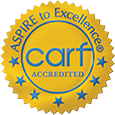Relapse prevention is more than just learning to withstand temptation or say no to drugs or alcohol. The best relapse prevention strategies are in place well before any temptation or opportunity for relapse presents itself. A well-considered strategy accounts for all potential triggers, temptations, situations, and other factors that may lead to relapse and the skills and coping mechanisms required to be able to face potential relapse situations with strength. Identifying the triggers leading to drug and alcohol abuse for each client and developing those strategies are two of the primary functions behind individual therapy sessions at Pax House. Relapse prevention is not just about having personal skills; it also requires having a support system. Isolation or trying to remain sober on one’s own increases the likelihood of relapse. It is essential to know who one will turn to, before there is a need.
There are many different elements to a strong relapse prevention strategy. A recovering addict needs to learn to build a beneficial and helpful social network that includes supportive, trustworthy people. Friends who enabled drinking/drug use need to be let go. Identifying and targeting the individual triggers that led to drugs or alcohol use will be critical for dismantling them. Healthy coping mechanisms need to be learned and integrated into stress responses. Acquiring relaxation methods against stress and anxiety can also help to prevent relapse. Being able to recognize warning signs of a relapse and having a concrete aftercare plan that draws upon the additional support of meetings, group sessions, or individual therapy, may be essential as well.
At Pax House, we work with our clients from day one on relapse prevention. We help to create an individual plan that will work for them to reduce their own risk of relapse. Part of our program includes education groups, which teach our clients about the disease of addiction, including what contributes to its development, typical triggers, coping mechanisms, and relapse prevention techniques. These groups occur in an interactive setting where clients can ask questions to ensure they receive the knowledge they need. Our clients also attend 12-step meetings every day of the week while in our treatment program. This creates a habit they can continue when they leave our program, which will help to ensure their continued recovery. During the treatment program, our clients come to recognize the underlying issues that led to their problem. They also take the time to identify triggers, temptation, and situations that could cause a relapse. As they learn healthy coping mechanisms to deploy when managing risky situations, they consider strategies such as trigger avoidance and the importance of creating a supportive network. We offer a continuum of care that meets the evolving independence of our clients. Some clients continue to meet with a private therapist after they finish the program. Some continue with our aftercare program which can provide them with the additional support they may need. Others opt for our outpatient program or choose to transition to our sober living facilities in order to prevent relapse during the earliest and toughest time of recovery.

